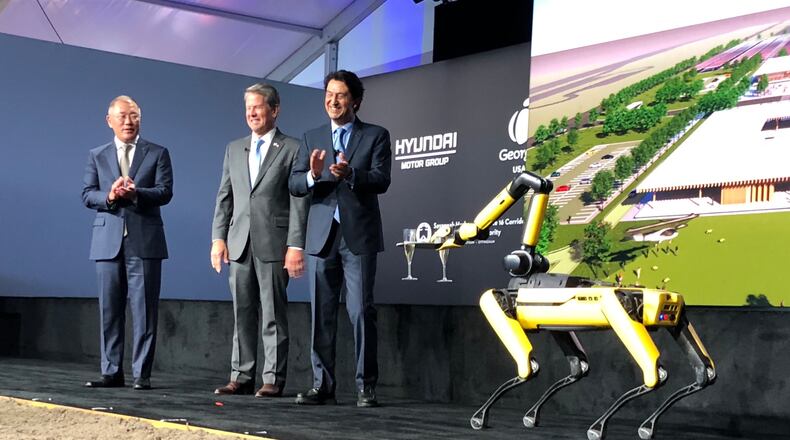ELLABELL — The groundbreaking of Hyundai Motor Group’s $5.5 billion “Metaplant,” the largest economic development project in state history, was a bipartisan affair. That didn’t mean it was apolitical.
Gov. Brian Kemp used the platform to tout his decision to roll back coronavirus restrictions in the opening months of the pandemic.
And South Korea’s ambassador to the U.S., Tae-yong Cho, delivered pointed remarks about a provision in the federal climate change law as Democratic U.S. Sens. Jon Ossoff and Raphael Warnock sat in the front row.
“Korean companies are now at risk of being disadvantaged by the EV credits of this act,” he said.
Cho referred to a measure in the Democratic-passed law that would require all EVs to undergo final assembly in North America to qualify for lucrative incentives. Since Hyundai’s factory won’t be operational until 2025, that would mean the automaker’s customers could lose out on the break.
Warnock, who is running for reelection against Republican Herschel Walker, recently introduced a measure to tweak the policy to delay that provision from taking effect until after Hyundai’s factory opens. Several influential Georgia Republicans at the event were hopeful it would pass later this year.
At a campaign stop in southeast Georgia, Kemp framed Hyundai’s decision as a validation of his economic development strategy. What the Republican didn’t mention was the fortuitous timing of the celebration, two weeks ahead of a Nov. 8 rematch against Democrat Stacey Abrams.
“These are jobs of the future coming to Georgia,” Kemp said. “The automotive industry will see more change in the next 10 years than in the prior 100.”
With an election looming, Democrats are reluctant to knock a deal that will bring 8,100 jobs to an often-overlooked part of the state. Abrams has instead panned the record $1.8 billion incentive package, which she said should have gone to small businesses.
President Joe Biden added his praise for the deal, saying his economic agenda “continues to pay off” for Georgia.
“This has been at the heart of the historic legislation we have passed over the past two years,” he said in a statement, “and the last thing we should do is repeal it as Republicans in Congress want to do.”
Read more about the groundbreaking and its political implications.
Credit: Arvin Temkar for the AJC
Credit: Arvin Temkar for the AJC
Stacey Abrams pulls back on TV ads two weeks before the vote
SAVANNAH — Democrat Stacey Abrams’ campaign for governor has been awash with cash since she entered the race in December. That’s why the latest round of ad spending surprised so many from both sides of the aisle.
After long spending more than $2 million each week to bombard the airwaves, records show Abrams shelled out roughly $800,000 this week on broadcast ads. Her campaign said the total bumps up to $1 million when including cable TV purchases.
Republican Gov. Brian Kemp’s campaign, by contrast, has reserved more than $2 million worth of ads this week. And groups backing Democratic U.S. Sen. Raphael Warnock account for more than $4 million in ad spending between Tuesday and Oct. 1.
Abrams, whose campaign reserved about $2.6 million in ads last week, released a closing TV message on Tuesday that focuses on an economic argument.
Heavily favored at home, GOP congressional candidate Mike Collins hits the road
Mike Collins, a trucking company owner, appears to be comfortable in his position as the Republican nominee in the 10th Congressional District. The east-central Georgia seat is heavily conservative, and he is the favorite to win in November.
With early voting underway in Georgia, Collins is hundreds of miles away today campaigning with a fellow Republican nominee in New Hampshire. It appears that Collins is making good on his promise to return to the Granite State to knock on doors for U.S. House candidate Karoline Leavitt, a former White House staffer under President Donald Trump.
Collins ran into Leavitt during a trip to New Hampshire last month and expressed support for the 25-year-old candidate, who hopes to unseat Democratic incumbent Chris Pappas and become the youngest woman ever elected to Congress.
Collins posted photos this morning from breakfast at a diner in Manchester, where he spoke to voters about Leavitt. He also participated in a neighborhood canvass with Leavitt supporters on Monday.
And Collins has also made it clear he supports the state’s Republican nominee for the U.S. Senate, Don Bolduc, who is challenging incumbent Democrat Maggie Hassan.
Bus tour aims to increase turnout among conservative women
MARIETTA — The side of the pink bus displays the slogan “She prays; she votes,” a nod to the Christian values many conservative women hold dear. But the back of it says, ““Honk if you know what a woman is!” That is a reference to the culture wars — transgender rights, in this case — that has also become a core motivating factor for conservative female voters this election.
The Concerned Women for America bus tour is spending three days in metro Atlanta as part of a nationwide effort that will ultimately include 40 stops in 12 states over three weeks.
Georgia Tech students Chloe Satterfield, who is originally from Cartersville, was among the speakers who encouraged conservative Christian women to get involved this election season.
“This election is going to be really close,” she said. “And suburban women, particularly, always swing elections. So it really comes down to whether or not they’re going to vote.”
The Latest
Featured





